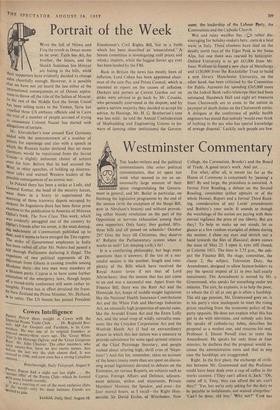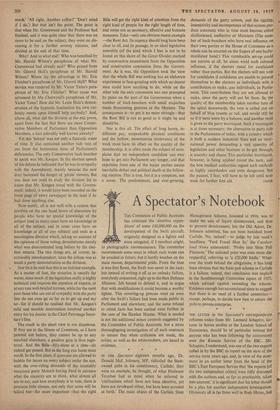Westminster Commentary
THE leader-writers and the political commentators (the other political commentators, that is) spent last week what seemed to me an un- necessarily large amount of their space congratulating the Govern- ment in general, and Mr. Butler in particular, on finishing the legislative programme by the end of the session (with the exception of the Shops Bill, now in Abraham's bosom) and without provok- ing either bloody revolution on the part of the Opposition or nervous exhaustion among their own supporters. Only fancy, they gushed, fifty- three bills and all passed on schedule! October 29? Give the boys till Christmas, they deserve it! Reform the Parliamentary system when it works so well? Let sleeping s.o:b.'s lie!
It is a comforting philosophy, but begs more questions than it answers. If the test of a suc- cessful session is the number, length and com- plexity of the Bills which have received the Royal Assent (even if not that of Lord Altrintham), then the session that has just come to an end was a successful one. Apart from the Finance Bill, there was the Rent Act and the Homicide Act, heaps of middle-weight legislation like the National Health Insurance Contributions Act and the White Fish and Herrings Industries Act, an unusually high proportion of special cases, like the Arundel Estate Act and the Extra Lolly Act, and the usual crop of wildly surrealist mea- sures like the Croydon Corporation Act and the Winfrith Heath Act (I had an extraordinary dream in which this last statute was a measure to provide subsistence for some aged spinster relative of the Chief Patronage Secretary, and people rushed about uttering high, shrill cries of 'Nepo- tism!') And this list, remember, takes no account of the hours (many more than are spent on discus- sing actual legislation) devoted to debates on the Estimates, on various Reports, on subjects such as Cyprus, Foreign Affairs and Defence, adjourn- ment debates, strikes and statements, Private Members' Motions, the Speaker, and even—for four mortal hours, as I recall—the Right Hon- ourable Sir David Eccles, of Winchester, New College, the Coronation, Brooks's and the Board of Trade. A good term's work. And yet. . . .
For what, after all, is meant (as far as the House of Commons is concerned) by 'passing' a Bill? By and large, the procedure is unvaried. A formal First Reading, a debate on the Second Reading, committee (either upstairs or of the whole House), Report and a formal Third Read- ing, consideration of any Lords' amendments and Bobbity's your uncle. It sounds as though the watchdogs of the nation are paying with their, eternal vigilance the price of our liberty. But are they? To help us make up our minds, let us glance at a few random examples of debate during the session. I close my eyes and stretch out a hand towards the files of Hansard; down comes the issue of May 23. 1 open it, eyes still closed, at Column 1411. The time is 3.55 p.m., the sub- ject the Finance Bill, the stage, committee, the clause 2, the subject, Television Duty, the Amendment, designed to allow licence-holders to pay the special impost of £1 in two half-yearly instalments. The Amendment is moved by Mr. Greenwood, who speaks foi something under ten minutes. The aim, he explains, is to help the poor, to whom the £1 all at one go is often a hardship. The old age pension, Mr. Greenwood goes on, is in his party's view inadequate to meet the rising prices resulting from the economic policy of the party opposite. He does not explain what this has got to do with television, and nobody asks him. He speaks of cathode-ray tubes, describes his proposal as a modest one, and resumes his scat. Professor J. Enoch Powell rises to resist the Amendment. He speaks for only three or four minutes; he declares that the proposal would in- crease the administrative costs and that in any case the hardships are exaggerated.
Right. In the first place, the exchange of civili- ties between Mr. Greenwood and the Professor could have been done over a cup of coffee in the works canteen. (They can't afford it, Jack."Oh, come off it, Tony, they can afford the set, can't they?"Yes, but we're only asking for the duty to be payable in instalments, not waived altogether.' 'Can't be done, old boy.' Why not?' 'Cost too
much: `All right. Another coffee?' Don't mind if I do.') But that isn't the point. The point is that when Mr. Greenwood and the Professor had finished, and it was quite clear that there was no more to be said on the subject, they went on dis- cussing it for a further seventy minutes, and divided at the end of that time.
Why? And to what end? Who was benefited by Mr. Harold Wilson's paraphrase of what Mr.
Greenwood had already said? Who gained from Mr. Glenvil Hall's paraphrase of Mr. Harold Wilson? Where lay the advantage in Mr. Eric Fletcher's paraphrase of Mr. Glenvil Hall? What service was rendered by Mr. Victor Yates's para- phrase of Mr. Eric Fletcher? What cause was advanced by Mr: Chetwynd's paraphrase of Mr. Victor Yates? How did Mr. Leslie Hale's demon- stration of the hypnotic fascination his own ver- bosity exerts upon himself help anybody? And, above all, what did the division at the end prove, apart from the fact that there are more Conser- vative Members of Parliament than Opposition Members, a fact tolerably well known already?
Yet this 'debate' was not only a fantastic waste of time. It also contained• another rich vein of ore from the bottomless mine of Parliament's deficiencies. The only Conservative back-bencher to speak was Mr. Keegan. In the shortest speech of the debate he indicated that he was in sympathy with the Amendment, mainly because the new duty increased the danger of 'pirate' viewers. But one does not need to study the division list to know that Mr. Keegan voted with the Govern- ment; indeed, it would have been recorded on the front page of every newspaper in the land if he had done anything else.
Now surely, all is not well with a system that involves on the one hand hours of discussion by people who have no special knowledge of the subject (and in many cases have no knowledge at all of the subject, and in some cases have no knowledge at all of any subject) and ends in a meaningless division which, taking no account of the opinions of those voting, demonstrates merely what was demonstrated long before by the elec- tion returns. The two things are, of course, in- extricably interdependent, since the debate was as much a party demonstration as the division.
Nor let it be said that this is an isolated example. As a matter of fact, the situation is usually far worse, since much of the legislation really is highly technical and requires the attention of experts, or at any rate well-briefed laymen, while for the most part those who are out of sympathy with the party line do not even go so far as to get up and say so—for it should be realised that Mr. Keegan's mild and sensible intervention involved another entry for his dossier in the Chief Patronage Secre- tary's files.
The result in the short view is not disastrous. If they are in the House of Commons, as I have pointed out before, they cannot be up to any mischief elsewhere; a positive gain is thus regis- tered. And the Bills—fifty-three at a time--do indeed get passed. But in the long run harm must result. In the first place, if ignorami are allowed to babble for hours on every subject under the sun, with the over-riding demands of the insatiably voracious party Moloch having fixed in advance what the majority are to think, what almost all are to say, and how everybody is to vote, there is precious little chance, not only that sense will be talked but—far more important—that the right Bills will get the right kind of attention from the right kind of people for the right length of time, and come out as necessary, effective and humane measures. Take—only one obvious recent example —the Rent Act. Its urgency should long have been clear to all, and its passage, in an ideal legislative assembly (of the kind which I fear is not to be found on this shore of the Great Divide) marked by constructive amendment from the Opposition and constructive concession. from the Govern- ment. As it was, the Opposition took the view that the whole Bill was nothing but an elaborate experiment in face-grinding with which no decent man could have anything to do, while on the other 'side the only concession was one prompted by panic on the part of the Government when a number of back-benchers with small majorities made threatening gestures at the Minister. The consequence is—to put it no more strongly—that the Rent Bill is not as good as it might be and should be.
Nor is this all. The effect of long hours, in- different pay, unspeakable physical conditions and the hollow, monotonous irrelevancy of the work must have its effect on the quality of the membership. It is often made the subject of com- plaint that no independent candidate can ever hope to get into Parliament any longer, and that expulsion from one of the major parties means inevitable defeat and political death at the follow- ing election. This is true, but it is a symptom, not a cause. The predominant, and ever-growing, demands of the party system, and the rigidity, insensitivity and incompetence of that system pro- duce automata who in time must become either disillusioned, ineffective or Ministers. (The num- ber of back-benchers who have real influence on their own parties or the House of Commons as a whole can be counted on the fingers of one badly- mutiliated hand.) This ramshackle set-up could not survive at all, let alone wield such colossal influence, if the electors voted for candidates rather than parties. But the electors will not vote for candidates if candidates are unable to present themselves to the electors as individuals with a contribution to make, qua individuals, in Parlia- ment. This contribution they are not allowed to make, since the party will not let them. So the quality of the membership takes another turn of the spiral downwards, the vote is called out on behalf of blue rosette or red, and would still be so if it were worn by a baboon, and another twist is given to the party tourniquet. Such a tourniquet is at times necessary; the alternative to party rule in the Parliaments of today, with a country which is both a modern industrial State and an inter- national. power demanding a vast quantity of legislation and other business to be got through, is anarchy and chaos. This particular tourniquet, however, is being applied round the neck, and the best medical authorities regard such methods as highly unorthodox and even dangerous. But the patient, I fear, will have to be left until next week for further first aid. TAPER































 Previous page
Previous page